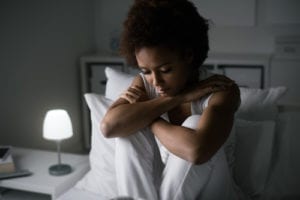There are many factors involved in mood disorders, so it’s important to speak with a licensed healthcare professional in order to receive an accurate diagnosis. However, recent studies are showing that if we are experiencing disruptive sleep-wake cycles, this could be indicative of major mood disorders such as bipolar disorder (BD) or depression. Consider your current sleeping habits. Do you find yourself resting peacefully all throughout the night? Would you even consider yourself to go into a deep sleep? Or is it on the opposite end of the spectrum – you feel constantly awake and toss and turn all throughout the night. Your sleeping habits could be signs of a serious medical condition, including a mood disorder.
A 2015 study published in the journal The Psychiatric Clinics of North America emphasized that residual sleep disturbance is common for those with mood disorders, particularly depression, BD, and others. A 2018 study conducted by researchers in the UK and published in The Lancet Psychiatry journal sought to explore subjective well-being, cognitive function, and mood disorder associations with disrupted sleep cycles. Individuals aged 37-73 years old participated in the study, wearing an accelerometer on their wrist for 7 days to analyze their activity levels and circadian rhythmicity (the body’s internal clock) of rest as well. A total of 91,105 participants were involved in the study, and researchers found that the lower the amplitude of circadian rhythm, the greater the risk of having lifetime major depressive disorder, lifetime bipolar disorder, mood instability, neuroticism, lower health satisfaction, and slower reaction times. Needless to say, your sleeping patterns say a lot about you.
According to the National Sleep Foundation, your circadian rhythm is your body’s internal clock that works on 24-hours; people typically experience dips in their rhythm (fatigue) around 2-4 a.m. (when they’re already asleep) and around 1-3 p.m. (shortly after lunch). If you’ve experienced events that could keep you from sleeping throughout the night and staying away during the day, you could off-set your circadian rhythm. If you’ve ruled out sleep disorders from a reputable sleep research center, you may want to speak with a professional from a reputable treatment center about being diagnosed for a mental illness or substance use disorder (SUD).
Avalon Malibu is a world-renowned, California state-licensed mental health and substance abuse recovery center. If you are ready to seek treatment to develop the tools you need to overcome life’s obstacles and be on the road towards happiness, health, and well-being, call us today at 888-958-7511 for a consultation. It’s never too late, and there are people here ready to help you.











